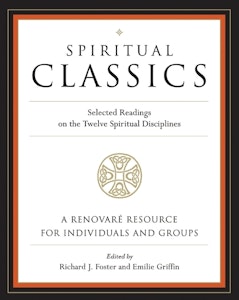 Excerpt from Spiritual Classics
Excerpt from Spiritual Classics
Reflections
Solitude is never complete without silence. Silence is solitude’s necessary and natural companion. Dom John Main writes, “Now to tread the spiritual path we must learn to be silent. What is required of us is a journey into profound silence.” Why is silence so helpful? It is not just that we use words to control and manage others and need to be free from such soul-destroying habits, though this is true enough. It is that we use words constantly to adjust our public image. You see, we fear so deeply what others think of us. If I have done some wrong thing, or even some good thing that I think you might misunderstand, and I learn that you know about it I am going to be very tempted to speak up and straighten you out on that matter. Now, silence is one of the deepest disciplines of the spiritual life simply because it puts the stopper on all that self-justification.
Through the discipline of silence, then, we are learning to place our reputation in God’s hands. We no longer need to be sure everyone understands us or thinks well of us. We let go of even needing to know what they think of us. We are silent.
Interestingly, we come to value words more in times of silence. This is because we are no longer cheapening words by overuse. We are still, and in the stillness we are creating an open, empty space where God can draw near. And in this stillness we just may hear God’s voice in his wondrous, terrible, loving, all-embracing silence.” —Richard J. Foster
Excerpts from Moments of Christ: The Path of Meditation
In the following selection, an essay taken from his book Moments of Christ: The Path of Meditation, Father John is not just teaching us a style of praying. Neither does he advise either solitude or silence just for its own sake. Silence is a path into the reality of the universe, where God is in charge and we are not, where we can be flooded by God’s love. Notice also how his understanding of this way of being flows out of scriptural understandings, such as those of St. Paul.
The Meaning of Silence
There is a great feeling among our contemporaries, I think, of the need, perhaps even the extremely urgent need, to recover the spiritual dimension in our lives. There is a feeling that unless we do recover that spiritual dimension we are going to lose our grip on life altogether.
Commitment to the spiritual reality is simply commitment to reality and it is the way to really appreciate the wonder of all life. It is the way to come to understand the extraordinary fact of the mystery of life itself, the inner hidden secret of life that gives it its real excitement.
Entering on the spiritual path is coming to appreciate our life as a voyage of discovery. It is certainly my experience that, if you set out on the path of meditation with this commitment to enter deeply into your own interior hidden life, then every day for you will become a revelation of new dimensions to that life and a deeper understanding of it.
A Journey into Profound Silence
Now to tread the spiritual path we must learn to be silent. What is required of us is a journey into profound silence. Part of the problem of the weakening of religion in our times is that religion uses words for its prayers and rituals, but those words have to be charged with meaning and they must be charged with sufficient meaning to move our hearts, to set us out in new directions and to change our lives. They can only be charged with this degree of meaning if they spring from spirit, and spirit requires silence. We all need to use words, but to use them with power we all need to be silent.
We all know that we can often come to know another person most profoundly in silence. To be silent with another person is a deep expression of trust and confidence and it is only when we are unconfident that we feel compelled to talk. To be silent with another person is truly to be with that other person. Nothing is so powerful in building mutual confidence between people than a silence which is easeful and creative. Nothing reveals inauthenticity more dramatically than silence that is not creative but fearful.
Letting Silence Emerge
I think what all of us have to learn is that we do not have to create silence. The silence is there within us. What we have to do is to enter into it, to become silent, to become the silence. The purpose of meditation and the challenge of meditation is to allow ourselves to become silent enough to allow this interior silence to emerge. Silence is the language of the Spirit.
These words of St. Paul writing to the Ephesians, are charged with the power of silence.
With this in mind, then, I kneel in prayer to the Father, from whom every family in heaven and on earth takes its name, that out of the treasures of his glory he may grant you strength and power through his Spirit in your inner being, that through faith Christ may dwell in your hearts in love. I pray that you may have the power to comprehend, with all the saints, what is the breadth and length and height and depth, and to know the love of Christ that surpasses knowledge, so that you may be filled with all the fullness of God. Now to him who by the power at work within us is able to accomplish abundantly far more than all we can ask or imagine, to him be glory in the church and in Christ Jesus to all generations, forever and ever. Amen. —Eph. 3:14 – 21
The words we use in trying to communicate the Christian message in the Christian experience have to be charged with strength and power, but they can only be charged with strength and power if they spring from the silence of the Spirit in our inner being… Leaving behind all other words, ideas, imaginations and fantasies is learning to enter into the presence of the Spirit who dwells in your inner heart, who dwells there in love. The Spirit of God dwells in our hearts in silence, and it is in humility and in faith that we must enter into that silent presence. St. Paul ends that passage in Ephesians with the words, “So may you attain to fullness of being, the fullness of God himself.” That is our destiny.
Excerpts taken from Spiritual Classics: Selected Readings on the Twelve Spiritual Disciplines (Richard Foster and Emilie Griffin, Editors. Harpercollins, 2000.) and used with gratitude and permission.
Text First Published December 1999



